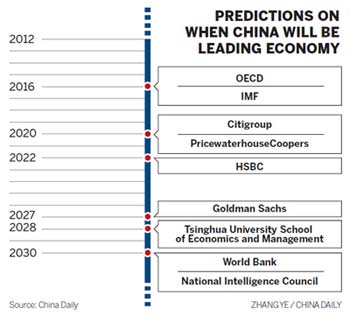
China is likely to have the world's largest economy by 2030 - surpassing the United States, the US National Intelligence Council said in a report released this week.
The country's rise will signify a shift in power from North America and Europe to Asia, the organization said.

The age of US and European dominance may be waning as emerging economies become increasingly important, the council said in its Global Trends 2030: Alternative Worlds report.
The organization is an analytical arm of the US Office of the Director of National Intelligence.
"China alone will probably have the largest economy in the world, surpassing that of the United States a few years before 2030," it said. "Meanwhile, the economies of Europe, Japan, and Russia are likely to continue their slow relative declines."
It also said China's total GDP will be 2.4 times as large as Japan's by 2030 and that "Asia will have surpassed North America and Europe combined in terms of global power, based upon GDP, population size, military spending, and technological investment".
The report is the first by the intelligence organization to give a specific prediction of when China will become the world's largest economy.
Still, the US is likely to remain "first among equals" in the division of global power, the report said.
As China's contribution to the global economy increases, the country is exerting ever greater influence on the United Nations, the World Bank and the International Monetary Fund, the report said.
By 2025, China will be the source of a third of all global economic growth, much more than any other economy in the world, it said. The IMF has predicted that China will have the biggest economy by 2016.
"It is likely that China will expand to the largest economy in the next 20 to 30 years," said Pieter P. Bottelier, a senior adjunct professor on China studies at the School of Advanced International Studies at Johns Hopkins University.
According to Chinese Academy of Social Sciences research, economic reforms will help ensure China's GDP grows at an average rate of between 7.5 and 8 percent in the next 10 years.
Economic growth in emerging markets is expected to be an impetus for technological innovation and lead to an increase in the flow of companies, ideas, entrepreneurs and capital to developing countries, the report said.
"During the next 15 to 20 years, more technological activities are likely to move to the developing world as multinationals focus on the fastest-growing emerging markets and as Chinese, Indian, Brazilian, and other emerging-economy corporations rapidly become internationally competitive," the report said.
Although the US council foresees the end of a unipolar world, the US will remain the only power "that can really orchestrate these coalitions, including non-state actors and state actors, to really manage, deal with these huge challenges and changes", said Mathew Burrows, counselor to the council.
?
Reuters contributed to this story.
?
Special Coverage
Feeling the Pulse of China's Economy
Related Readings